Several women in post-graduate theological studies at Toronto School of Theology (TST) challenged the 20 women and men who gathered on a Saturday in early May with new ways of thinking about church, theology and mission. The symposium was sponsored by Toronto Mennonite Theological Centre and supported by Mennonite Church Eastern Canada (MCEC).
For some, it brought back memories of Women in Ministry conferences during the 1980s, with stories and laments of the missing voices of women in the mission and ministry of the church. For other attendees, this was their first experience hearing what feminist scholars have to contribute. Women and men in active ministry responded to the evocative presentations on the church’s theology and mission within our challenging post-Christendom context.
Kim Penner and Allison Murray planned and facilitated this event, “Engaging Women’s Voices on Church, Theology and Mission.” Both women began theological studies at Conrad Grebel and are now enrolled in doctoral programs at TST. A reading of Acts 10, led by Marilyn Zehr, graduate of TST and pastor of Toronto United Mennonite Church, set the tone for the day, as participants observed that both Peter and Cornelius, seasoned apostle and new believer, were changed by their spirit-led encounter.
One could sense some ambivalence in the room as we listed words traditionally associated with mission such as: Great Commission, missionaries, proclamation, and colonialism. Susan Kennel Harrison, doctoral candidate at TST, filled in the picture with an overview of the history of Mennonite mission agencies in North America.
Hearing from women of differing faith traditions and cultural backgrounds greatly enriched the day. From the Roman Catholic tradition, Abigail Lofte challenged us to consider what Christian mission would look like if we humans were to take seriously our responsibility to care for the earth. What does the church’s doctrine of resurrection, God’s ultimate affirmation of life, ask of Christians in relation to the degradation of planet Earth?
In his response, Henry Paetkau, area church minister with MCEC, wondered whether women who are created with the ability to be “life bearers” can help us better understand the interconnectedness of all life. Can women move us to a more robust understanding of discipleship that broadens our concept of “community” to include the entire created order?
Ajeng Chrissaningrum presented her research with evangelical and secular Javanese women in Indonesia using an innovative methodology called “theology by heart.” As the women tell their stories, Ajeng listens for their experiences of God, especially in times of suffering. Her findings challenge traditional approaches to mission focussed on verbal proclamation, social justice and discipleship. “By encouraging and listening to [the women’s] life-stories with God, the church invites these women as partners in mission,” concluded Ajeng.
Brian Bauman, mission minister with MCEC, affirmed Ajeng’s approach of giving voice to these women. “Though painful, it’s important for me as a male to hear these stories of pain and oppression caused by men, some of whom are leaders in the church,” responded Brian. “They remind us to pay attention to the Spirit’s nudging before we speak.”
Susanne Guenther Loewen, a Mennonite scholar living in Winnipeg while completing doctoral studies at TST, tackled the unsettling question, “Can the cross be ‘good news’ for women?” She cited feminist theologian and pastor Carol Penner’s observation that Mennonites have been largely silent on the topic of violence against women and women’s suffering. Susanne contends that the cross can be good news for women, but only if it is “carefully (re)interpreted theologically as well as ethically.” Not all suffering is redemptive, and the church causes further harm if it interprets the cross as a message to women that they must quickly forgive violence and abuse.
Susan Kennel Harrison, who is on the chaplaincy team at University of Toronto, responded with a personal story of being told by a Bible professor that “perhaps [the abuse] is your cross to bear.” He later changed his response, but his first instinct is all too familiar to women who have gone to church leaders looking for understanding and support on their journey out of abusive relationships.
By the end of the morning we added new words to the list associated with mission: relationship with creation, resurrection, renewal of theology, listening, sanctity of all life, integrity, wholeness-making, and shared power. We left with new insights and questions swirling in our minds, hoping that somehow the conversation will be continued.
Since retiring from formal ministry, Muriel Bechtel volunteers as a spiritual care visitor in palliative care and presides, as needed, at funerals at Erb & Good Family Funeral Home, in Waterloo, Ont.
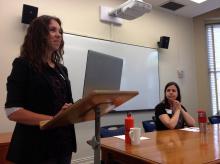
Kim Penner (left) and Allison Murray planned and facilitated a symposium, “Engaging Women’s Voices on Church, Theology and Mission,” sponsored by Toronto Mennonite Theological Centre, with support from Mennonite Church Eastern Canada.
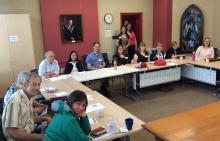
After a full morning of “food for thought,” the diverse group of participants enjoy a fine feast of Indian foods and stimulating conversation about the ways in which their concept of the church’s mission had been expanded. (Photo by Michele Rizoli)
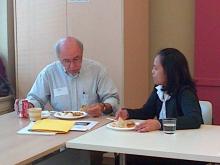
John Rempel, retiring director of Toronto Mennonite Theological Centre enjoys food and conversation with Ajeng Chrissaningrum who presented a paper, “Hard pressed but not crushed,” which was about her research with Javanese Christian women from Indonesia. (Photo by Kim Penner)
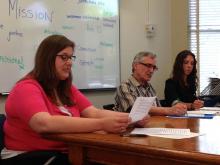
Abigail Lofte presents a paper on “Rethinking Humanity’s Relationship with the Earth and its Implications for the Church’s Mission in Light of the Resurrection” as respondent, Henry Paetkau, area church minister for Mennonite Church Eastern Canada and symposium moderator Kim Penner listen. (Photo taken by Susan K. Harrison)

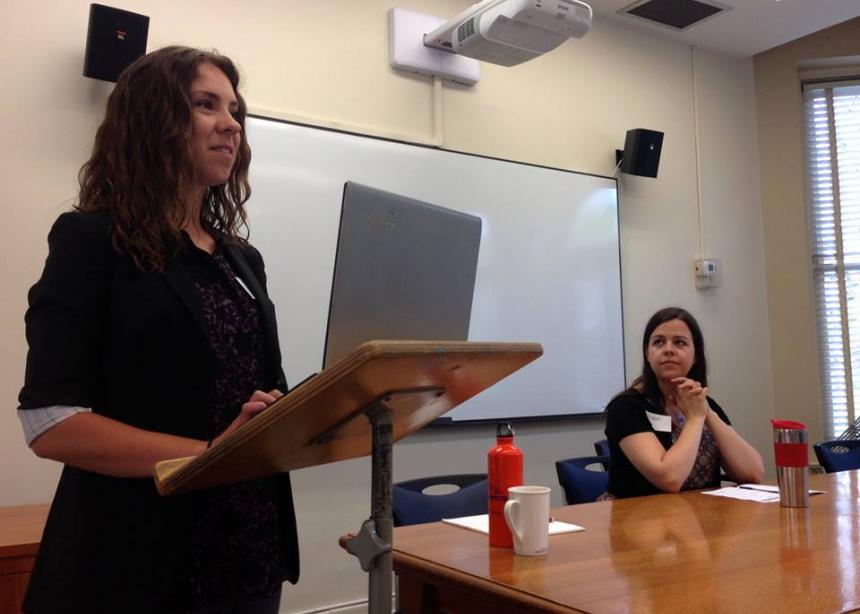

Add new comment
Canadian Mennonite invites comments and encourages constructive discussion about our content. Actual full names (first and last) are required. Comments are moderated and may be edited. They will not appear online until approved and will be posted during business hours. Some comments may be reproduced in print.